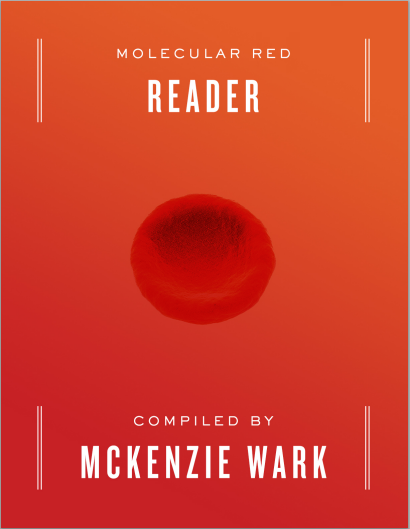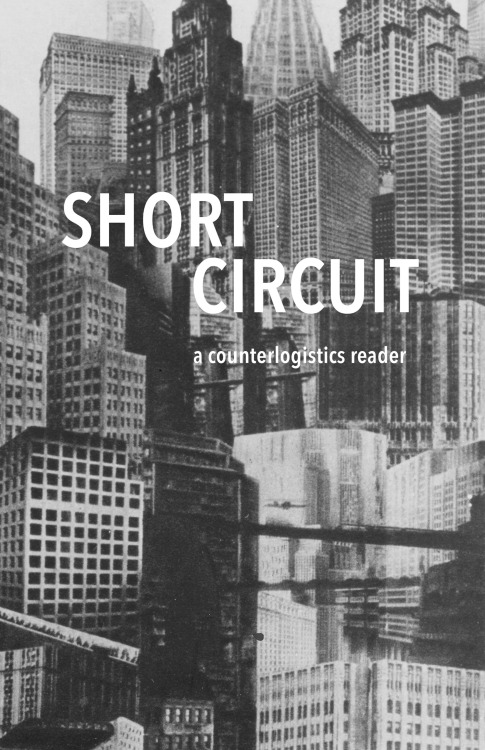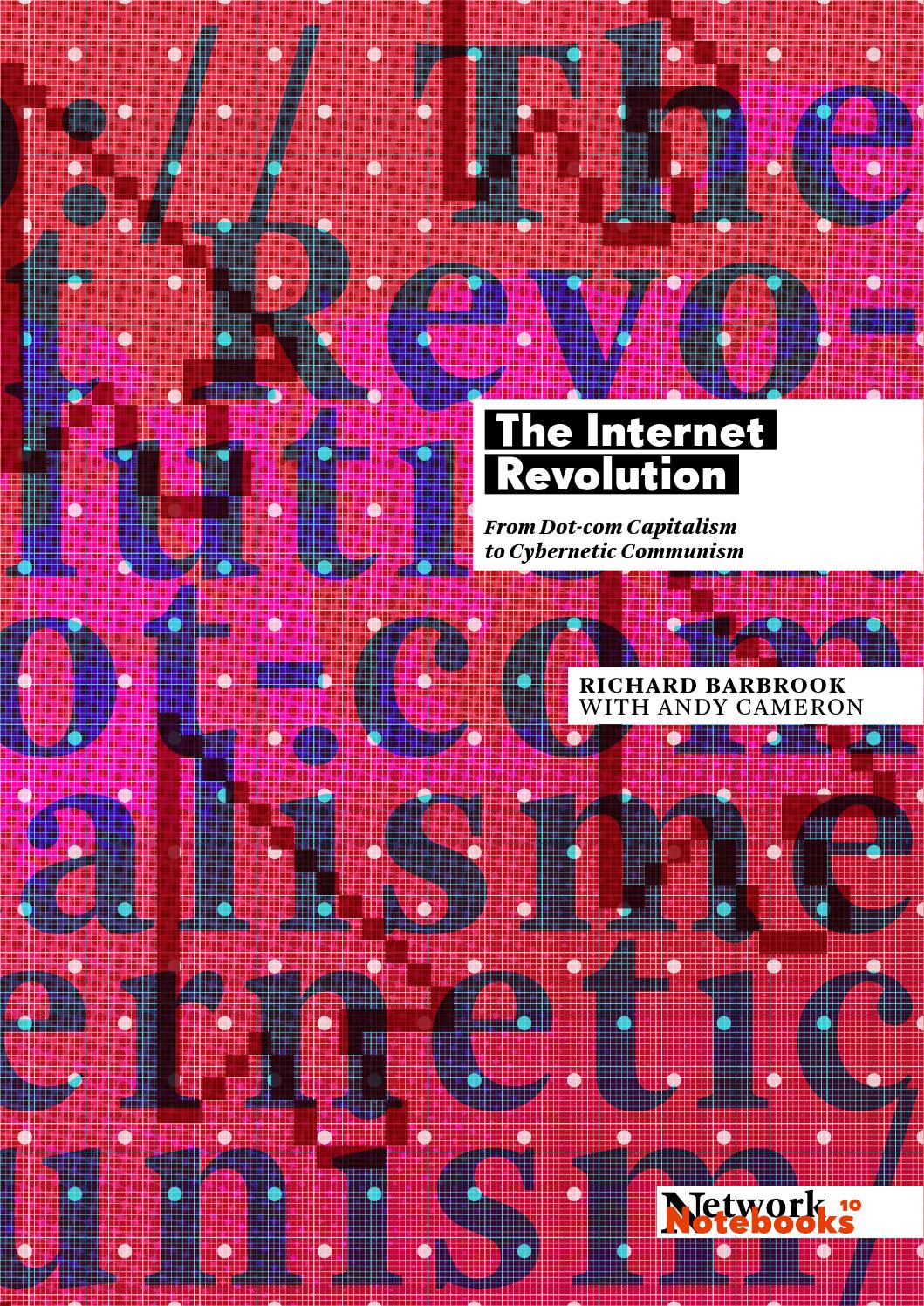McKenzie Wark: Molecular Red: Theory for the Anthropocene (2015)
Filed under book | Tags: · agriculture, anthropocene, climate, climate crisis, communism, cyborg, environment, knowledge, labour, literary criticism, marxism, nature, philosophy, production, proletariat, proletkult, revolution, science, science fiction, technoscience, tektology, theory, utopia


“In Molecular Red, McKenzie Wark creates philosophical tools for the Anthropocene, our new planetary epoch, in which human and natural forces are so entwined that the future of one determines that of the other.
Wark explores the implications of Anthropocene through the story of two empires, the Soviet and then the American. The fall of the former prefigures that of the latter. From the ruins of these mighty histories, Wark salvages ideas to help us picture what kind of worlds collective labor might yet build. From the Russian revolution, Wark unearths the work of Alexander Bogdanov—Lenin’s rival—as well as the great Proletkult writer and engineer Andrey Platonov.
The Soviet experiment emerges from the past as an allegory for the new organizational challenges of our time. From deep within the Californian military-entertainment complex, Wark retrieves Donna Haraway‘s cyborg critique and science fiction writer Kim Stanley Robinson’s Martian utopia as powerful resources for rethinking and remaking the world that climate change has wrought. Molecular Red proposes an alternative realism, where hope is found in what remains and endures.”
Publisher Verso, London and New York, March 2015
ISBN 1781688273, 9781781688274
xxiv+280 pages
Reviews: Slavoj Žižek (Verso 2015, Wark’s response), John Beck (Radical Philosophy 2015), Mark Rappolt (ArtReview 2015), Maria Chehonadskih (Mute 2015, Wark’s response), Two Grenadiers (2015), Pieter Vermeulen & Tom Chadwick (nY 2016), Jim Harper (LSE Review of Books 2016).
Commentary: Joe Guinan (Renewal 2015), Jernej Kaluža (Radio Student 2019, SL).
Video lecture (Concordia U, Apr 2015)
Publisher
WorldCat
See also Molecular Red Reader compiled by Wark (PDF).
Comment (0)Short Circuit: A Counterlogistics Reader (2015)
Filed under book | Tags: · communism, cybernetics, infrastructure, logistics

““Counter-logistics is not simply a matter of blocking all flows, of stopping movement, of locking things in place where they are. It is a matter of blocking those flows that constitute the material and metaphysical tissue of this world, while simultaneously enhancing our own ethical connections, movement, and friendship. Helping migrants to cross borders and remain undetected, helping information to cross through and within prison walls, destroying surveillance cameras, defending the basis of new worlds seized in opposition to the old—these are as important as blocking rail lines and disrupting commerce.”
This book is a collection of critical texts focused on logistics, counter-logistics, and cybernetics. It attempts to combine some disparate groups and tendencies that have all taken a recent turn towards evaluating infrastructure and logistics as a crucial element in the perpetuation of capital and control, and as vulnerable points worthy of study, evaluation, and attack.”
With texts by Anonymous, Jasper Bernes, Max L’Hameunasse, Tiqqun, Leon de Mattis, Out of the Woods, 1882 Woodbine, and Degenerate Communism.
Publisher No New Ideas, Aug 2015
xiii+245 pages
via pht
single PDF (4 MB)
PDF chapters
Richard Barbrook with Andy Cameron: The Internet Revolution: From Dot-com Capitalism to Cybernetic Communism (2015)
Filed under book | Tags: · californian ideology, capitalism, communism, cybernetics, cyberspace, internet, libertarianism, neoliberalism, net criticism, silicon valley, technology, virtual reality

“Richard Barbrook and Andy Cameron’s The Californian Ideology, originally published in 1995 by Mute magazine and the nettime mailinglist, is the iconic text of the first wave of Net criticism. The internet might have fundamentally changed in the last two decades, but their demolition of the neoliberal orthodoxies of Silicon Valley remains shocking and provocative. They question the cult of the dot-com entrepreneur, challenging the theory of technological determinism and refuting the myths of American history. Denounced as the work of ‘looney lefties’ by Silicon Valley’s boosters when it first appeared, The Californian Ideology has since been vindicated by the corporate take-over of the Net and the exposure of the NSA’s mass surveillance programmes.
Published in 1999 at the peak of the dot-com bubble, Richard Barbrook’s Cyber-Communism offers an alternative vision of the shape of things to come, inspired by Marshall McLuhan’s paradoxical ‘thought probes’. With the Californian Ideology growing stronger, the Net was celebrated as the mechanical perfection of neoliberal economics. Barbrook shows how this futurist prophecy is borrowed from America’s defunct Cold War enemy: Stalinist Russia. Technological progress was the catalyst of social transformation. With copyright weakening, intellectual commodities were mutating into gifts. Invented in capitalist America, the Net in the late-1990s had become the first working model of communism in human history.
In an introduction written specially for this 20th anniversary edition, Richard Barbrook takes a fresh look at the hippie capitalists who shaped Silicon Valley and explains how their influence continues to this day. These thought probes are still relevant in understanding the contradictory impact of ubiquitous social media within the modern world. As McLuhan had insisted, theoretical provocation creates political understanding.”
Publisher Institute of Network Cultures, Amsterdam, Oct 2015
Network Notebooks series, 10
Creative Commons Attribution-NonCommercial-ShareAlike 4.0 International License
ISBN 9789492302014
51 pages
Replies to ‘The Californian Ideology’ published in Mute 4 (Spring 1996): Introduction, Louis Rossetto (Wired’s editor-in-chief), Franco (Bifo) Berardi, Celia Pearce.
PDF, PDF (4 MB)
EPUB, EPUB (3 MB)
Issuu

